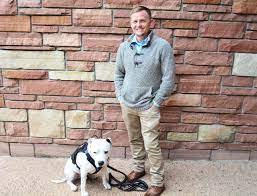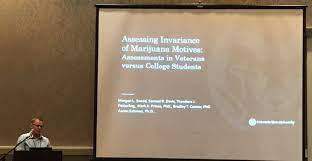Click here to support the Morgan Sneed Memorial Scholarship.

Morgan Sneed passed away on 11/18/2020. The cause of death is unknown at this time. For those who knew Morgan, you know what a significant loss this is. For those of you who didn’t know Morgan, he was a graduate of Psychology and the Certified Addiction Counselor Concentration at Colorado State University. He was a graduate of the second cohort of the Masters in Addiction Counseling in Psychology program, also at CSU. He was a member of our family, a member of the Development of Risky and Addictive Behaviors Lab.
More than any of that, Morgan was a good man and a better friend. He was committed to helping people even as he dealt with his own issues. He was selfless. He was an advocate. He loved dogs, both his and yours. He would do just about anything for just about anyone who asked. He loved to cook and he was great at it. He was committed to helping others.
Morgan was a veteran who served in Iraq and Afghanistan. He was injured in combat. He was a hero. He had a traumatic brain injury and post-traumatic stress disorder and he spoke openly about how this affected him. You can read more details about this here: https://collegian.com/articles/aande/features-aande/2017/10/living-with-ptsd-csu-veteran-overcomes-trauma-to-develop-recovery-program/. Because of his PTSD, he had a service dog, Dakota. Dakota was also part of our family.
Morgan was the exact type of person who should be in the counseling profession. He was always trying to better himself so he could be more effective when helping others. He went to specialized trainings and studied treatment methods in his spare time. He wanted to open his own sober living facility so that he could help others struggling with substance use disorders, and he was also interested in researching trauma and trauma treatments.
Morgan worked hard at everything he did and, while not always successful, I watched him do far more with far less than most people I know. He joined our research lab but had very little experience doing scientific research. He attended our lab meetings in his free time and soaked up as much information as he could. When a project presented itself comparing the psychometrics of a cannabis use motives scale in a veteran population compared to a college student population, he jumped in with both feet and took the lead. He taught himself about invariance testing, and he had a better grasp of it than most Ph.D. students I know who have studied the topic. We were working on writing this project up in manuscript from when Morgan passed.

I have never been more impressed with Morgan than when I watched him present research at a conference a few summers ago. He taught himself so much in such a short period of time. He was anxious to present in front of an audience of scientists, all of whom he assumed knew more than he did. Even though we told him he was wrong, that he was ready, we couldn’t convince him. Morgan got up and gave one of the best presentations I have ever seen, and then he came over and apologized to me for not representing the lab better. That was who Morgan was.
Morgan recently purchased his first home in Loveland. He was planning to apply to Ph.D. programs this December. He wanted to get a Ph.D. in Clinical or Counseling Psychology. He wanted to research trauma so that he could develop more effective trauma treatments.
I was lucky enough to have Morgan call me one of his mentors. I benefitted from the relationship at least as much as he did. Morgan taught me a lot in a short period of time, mostly about character, drive, determination, and about how to be a better person. For that, I am forever grateful. Morgan was a part of our family and will be sorely missed by all of us who knew him well.
Brad Conner
